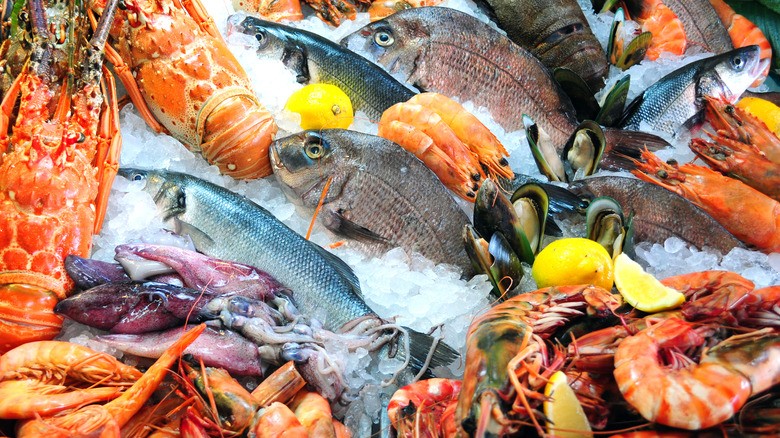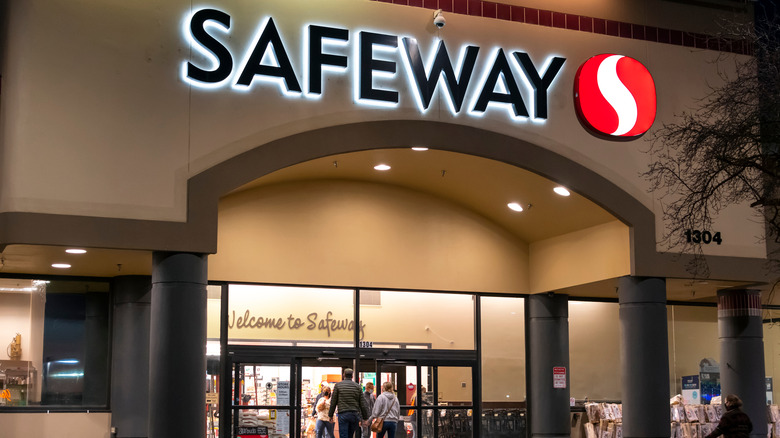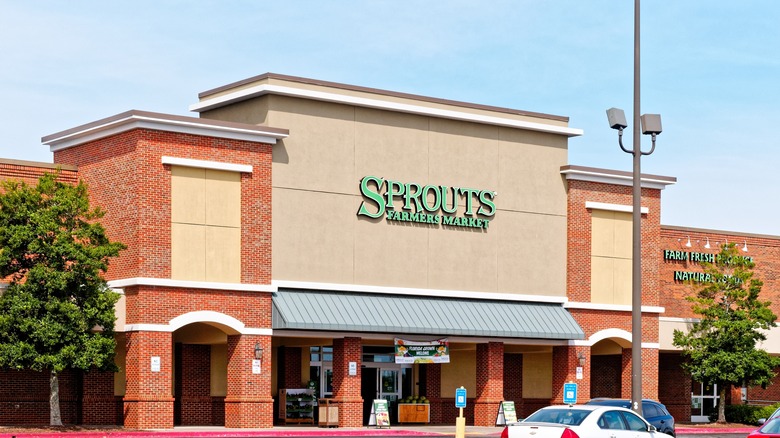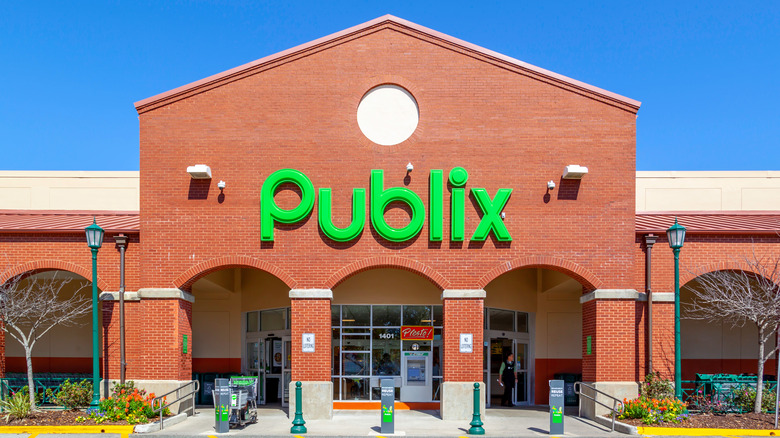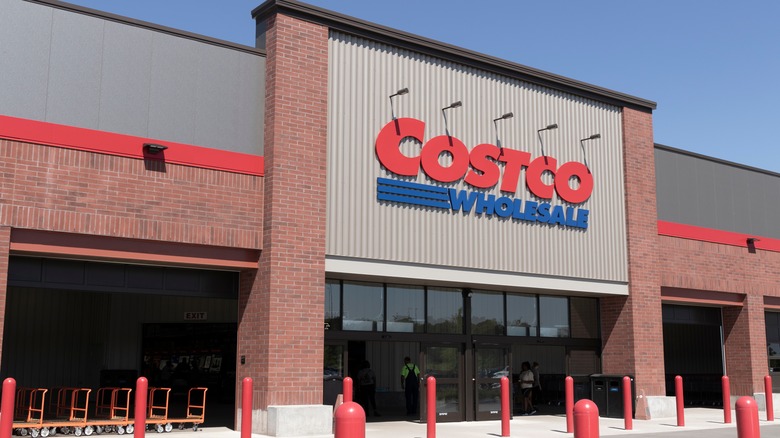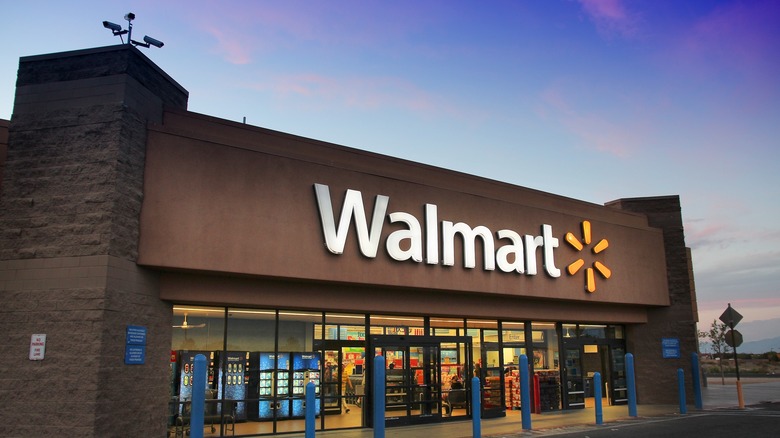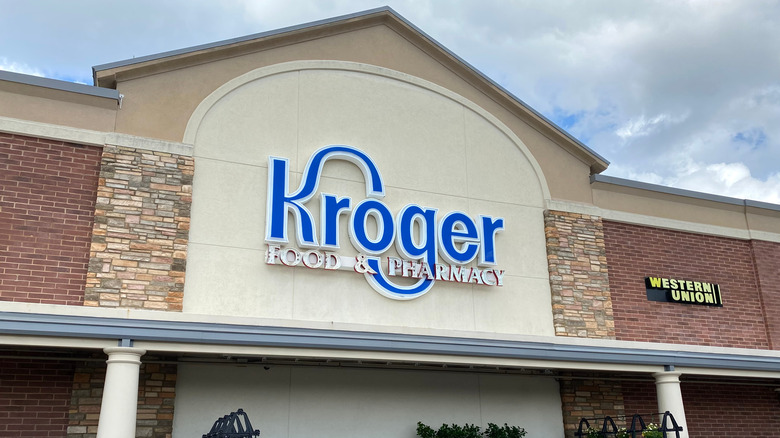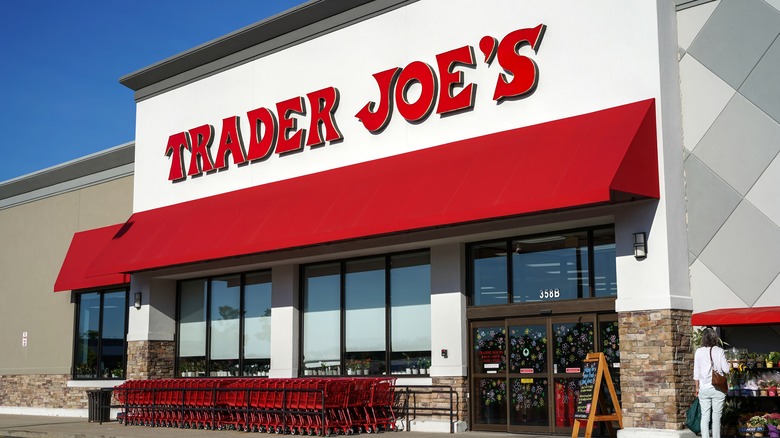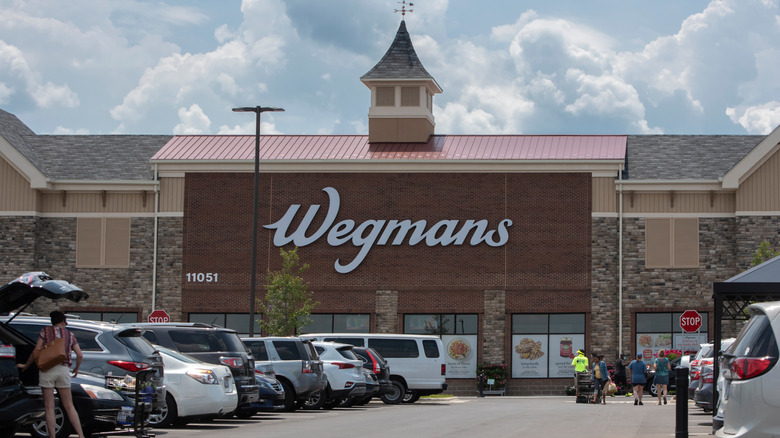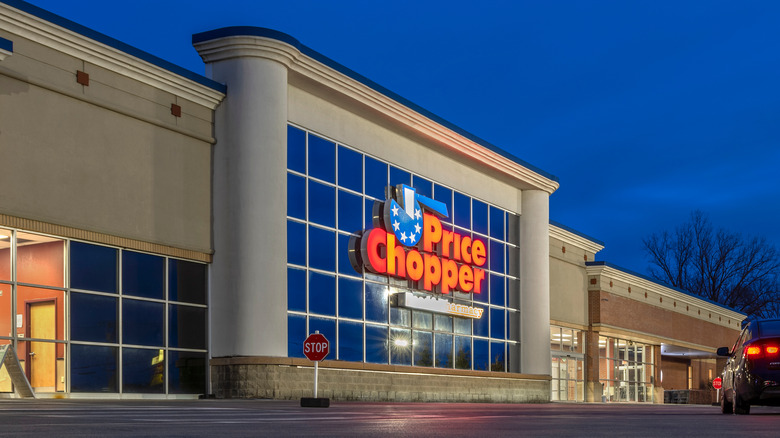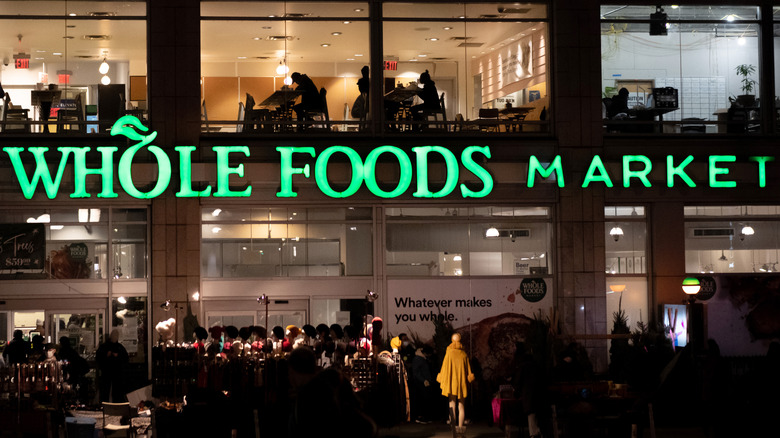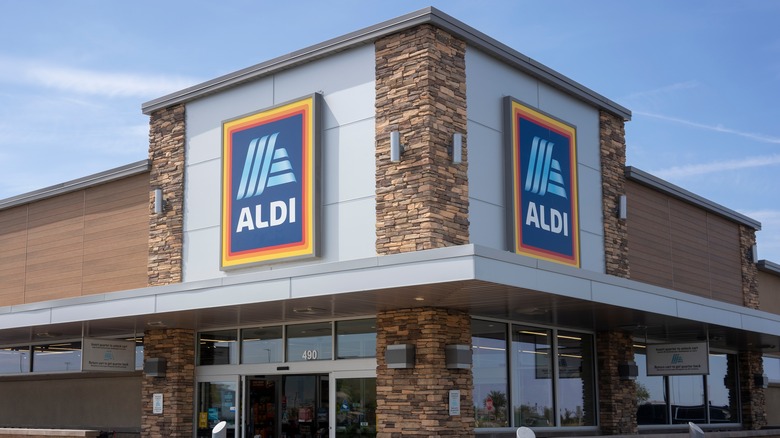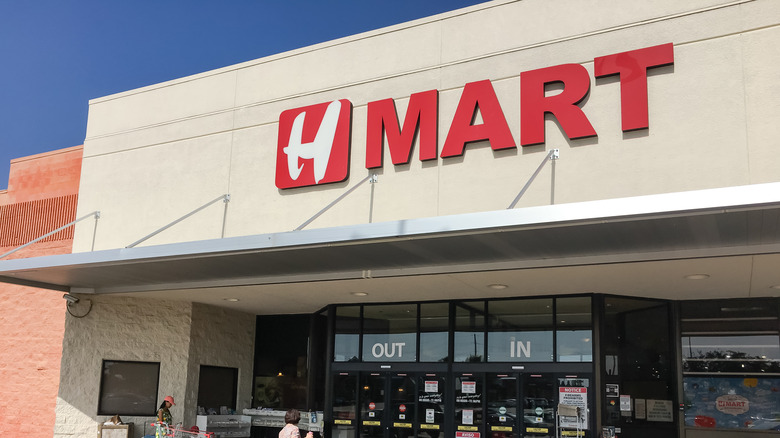12 Best And Worst Grocery Stores To Buy Fish
When it comes to grocery shopping, few sections are as exciting and overwhelming as the seafood department. Modern supermarkets offer dozens of fresh, frozen, prepared, and even live seafood options. Now more than ever, home cooks can easily buy everything they need to whip up delicious seafood recipes at their local grocery chains. However, this wealth of options can make it challenging for consumers to know which stores offer the best seafood. It's important to consider more than just flashy product displays to determine which grocery stores are the best and worst for buying fish.
According to the Marine Stewardship Council, consumers should also look for responsibly sourced seafood products from suppliers that employ sustainable fishing practices. These products support a healthy, ongoing seafood supply in the world's oceans and help fishing communities flourish. The best grocery stores boast a wide selection of responsibly farm-raised and wild-caught seafood products, many of which have earned sustainability certifications from leading organizations. This means that shoppers can purchase products that are both tasty and eco-friendly. On the flip side, there are other grocery stores that have questionable seafood sourcing practices and lower-quality products that customers should avoid.
1. Worst: Safeway
Safeway has been open for more than a century, but its seafood quality leaves a lot to be desired. For instance, the store's packaged sushi may not be a smart purchase. In a taste test for Washingtonian, the retailer's Ace California roll failed, with one reviewer comparing the texture of the outer wrapper to a bandage.
Furthermore, there is evidence that the brand's seafood department practices can be problematic. WUSA-9 reports that one Safeway sold clams unfit for consumption and mistreated a customer when she made them aware of it. Though this is an isolated incident, it suggests that Safeway may need to improve how it trains seafood department employees. According to The Oregonian, Safeway recalled Ready Meal seafood products in the Pacific Northwest for improper labeling. The report explains that the company failed to identify anchovy — a known allergen — on the ingredient lists, a potentially deadly mistake.
Despite these issues, Safeway shows signs of improvement. For instance, in a survey of national grocery stores, Greenpeace gave Safeway's parent business, Albertsons Companies, low marks for carrying unsustainable seafood products. After this survey, the company updated its policies to improve sustainability. In addition, The Washington Post featured Safeway in an article about growing consumer interest in sustainable seafood. According to the report, the retailer helped a nonprofit called FishWise establish a program to demystify the seafood buying process.
2. Best: Sprouts Farmers Market
Many grocery store chains pride themselves on offering sustainably sourced seafood products to customers. Sprouts Farmers Market champions this important environmental cause and describes its philosophy in its extensive seafood policy. The retailer prioritizes sustainability and transparency in its seafood sourcing by avoiding suppliers that employ questionable practices. Instead, Sprouts strives to source its seafood from suppliers that have earned certifications from international organizations such as the Marine Council Stewardship or GlobalGAP.
Due to the brand's commitment to quality and sustainability, its fresh, frozen, and prepared seafood items are all worthwhile purchases. For example, the wild ahi tuna steaks are one of many previously frozen products that have earned near-perfect scores on the company's website. However, one of the retailer's most notable seafood offerings is sushi. Grocery store sushi has a reputation for being lower quality than restaurant options, but according to The Healthy Patron, the sushi at Sprouts Farmers Market is worth a try. The retailer makes fresh sushi daily and sells nearly a dozen varieties. Furthermore, this grocery store offers a $5 sushi deal every Wednesday at stores nationwide, so that consumers can enjoy their favorite sushi rolls at a lower price.
3. Worst: Publix
The Southeastern U.S. is home to Publix, a beloved grocery chain that has been in business since 1930. Over the years, Publix has become more popular with consumers, and despite its relatively small size, the chain frequently tops lists of the best companies to work for and the best grocery stores for shoppers. Publix even took the top spot on Newsweek's list of America's Best Customer Service 2023 in the supermarket category, an honor the retailer has achieved for several years. In addition to excellent customer service, Publix offers a variety of high-quality products, including certified organic items under its private label, Greenwise.
However, seafood is something consumers may want to skip buying at Publix. A seafood expert on Reddit explains that Publix's quality standards can vary widely from store to store. They blame this on differences in sales volume, as well as training inconsistencies among employees. This lack of standardization means customers may get products of varying quality at every location.
For example, one YouTube reviewer cautions against buying prepackaged shrimp platters at her local Publix due to issues with texture and flavor. Sadly, shrimp isn't the only potentially problematic seafood at Publix: A Wesh Orlando report states that the retailer issued a recall on oysters from a particular supplier after several customers became ill. Of course, recalls can happen to any retailer, but Publix may want to reconsider some of its supplier relationships to improve quality.
4. Best: Costco
Since its beginnings in 1976, Costco has amassed a cult-like following among its club members. This brand loyalty stems from the quality of its product offerings, but Costco customers also enjoy the wholesale grocer's competitive prices. Although the company first launched in California, it now operates in nearly a dozen countries worldwide. For consumers who prefer purchasing their favorite seafood items in bulk, there are many excellent options. For instance, customers can find crab legs, fresh fish, and even fully prepared items such as crab cakes and salmon burgers. In addition, Costco seafood is a smart buy because of the global retailer's sustainability commitment and generous return policy.
Costco carries various seafood brands, but its private-label products are some of the most well-loved. For example, Costcuisine offers glowing praise for one frozen private-label product: Kirkland Signature wild Alaskan sockeye salmon. According to the review, this salmon has a rich flavor and holds up well to any cooking method. In addition, unlike many frozen fish products, this salmon retained a pleasant texture even after thawing. For salmon lovers who enjoy their favorite fish smoked, Shopping With Dave suggests trying the Kirkland Signature wild Alaskan smoked sockeye salmon, because of its delicious taste and low price point.
5. Worst: Walmart
Walmart is well known for its ultra-low prices and abundance of store locations. Since opening, the company has ballooned into a massive corporation with thousands of brick-and-mortar stores. According to Supermarket News, it is among the largest grocery retailers in the U.S. based on sales. However, bigger is not always better in terms of seafood quality. In a Mashed survey, 33% of participants believe that Walmart needs to improve the quality of its seafood.
Walmart customers mirror this opinion on the brand's website, where they have given multiple frozen seafood products negative reviews. For example, Great Value frozen wild caught pink salmon reviews complain about the product's consistency, portion size, and overall flavor. However, Walmart has responded to consumer complaints by improving its seafood quality. In a 2020 interview with the Food Marketing Institute, two Walmart representatives explained that the retailer planned to focus on sustainable sourcing and had even enacted an official policy for its seafood practices. The representatives also noted that the brand actively encourages suppliers to improve their sourcing performance and achieve sustainability certificates. These initiatives will lead to higher-quality products in the future, which is good news for loyal Walmart customers.
6. Best: Kroger
One of the largest grocery corporations in the U.S. is Kroger, which encompasses many popular supermarket chains. Kroger uses its large size to its advantage by focusing on various sustainability and social responsibility initiatives. For example, Live Naturally Magazine explains that the retailer won a Food Recovery Award from the U.S. Environmental Protection Agency for reducing food waste in 2016. This commitment to responsible sourcing makes Kroger a great place to buy fresh and frozen seafood.
In 2021, WWF Seafood Sustainability reported that the company had reinvigorated its commitment to sustainable sourcing by setting new goals and revamping its existing policies. Most notably, the report explains that one of the retailer's goals is to source its seafood exclusively from farms and fisheries with sustainability certifications. As a result, the retailer has increased its efforts to find reputable suppliers to meet this goal.
For example, according to Seafood Source, Kroger works with seafood and other product suppliers through its Go Fresh & Local Supplier Accelerator program. This initiative invites suppliers of all sizes to showcase their best offerings for a chance to sell products in surrounding Kroger stores to provide consumers with the freshest local seafood available. In addition, the Kroger store brand features multiple varieties of frozen wild-caught fish, including salmon, halibut, and shrimp.
7. Worst: Trader Joe's
California-based Trader Joe's is a small chain that has significantly impacted its customers. Shoppers are fiercely loyal to this retailer because of its unique products, friendly staff, and commitment to socially responsible practices. This supermarket focuses on exclusive private-label products and openly welcomes customer feedback. According to Real Simple, the brand even hosts an annual Customer Choice Awards event that allows consumers to vote for their favorite products. Although there is a lot to love about this grocery chain, customers may want to avoid its collection of seafood products.
One big issue arises from the frequent product lineup changes intended to keep the shopping experience fresh and exciting. With so many items coming and going, it's no surprise that quality can be inconsistent. Some seafood products at Trader Joe's inspire cult followings, while others fail to meet customer expectations. For example, the brand's wild raw Argentinian shrimp is a big hit among customers, with one TikTok user proclaiming that this product is the only shrimp they'll continue buying. However, reviewers on Trader Joe's Reviews describe the now-unavailable tempura shrimp crunch rolls as disgusting and mushy. In a product review, Buying Seafood also notes that Trader Joe's needs to be more transparent about seafood sources on its packaging, which is something its eco-conscious customers would appreciate.
8. Best: Wegmans
Since its launch in 1916, Wegmans has remained a private, family-owned supermarket chain. It primarily serves customers in the northeastern U.S. but has stores as far south as North Carolina. In 2022, Wegmans ranked third on the Fortune 100 Best Companies To Work For list, and the brand consistently achieves high marks in customer satisfaction polls. One feature that sets this chain apart from other supermarkets is the sheer size of its stores, which are large enough to house a coffee shop and indoor cafe in addition to traditional grocery offerings. Based on quality, variety, and a commitment to transparency, Wegmans is an excellent option for seafood shoppers.
Although the company is small, it has made significant efforts to champion sustainability and responsible sourcing practices in the supermarket industry. For example, an article on the company website explains that the brand has stopped using single-use foam coolers to transport its seafood products from suppliers to stores. Furthermore, Wegmans received high marks from Greenpeace for sustainability, earning a score of 73/100. The report explains that the retailer has a good sustainability policy and is active in the fight against illegal fishing and habitat destruction. A great example of the company's practices is its salmon sourcing, which takes into account various factors from freshness to eco-efficiency.
9. Worst: Price Chopper
The New York-based grocery chain Price Chopper opened its doors in 1932 and is now part of the Golub Corporation of supermarkets. According to The Buffalo News, the corporation shares its name with the Golub family, the originators of the Price Chopper brand. The business remains family-owned and operates over 100 stores across the Northeast. As the name suggests, this retailer focuses on offering competitively priced products to its customer base. In addition to leading brand and private-label products, the chain offers a publication called Price Chopper Ready to help consumers get the most out of their purchases. This publication includes recipes that suit a variety of diets and cooking styles. However, despite this retailer's positive qualities, consumers may want to steer clear of its seafood department.
Price Chopper is one of the lowest-ranked grocery stores on the Supermarket Seafood Ranking list that Greenpeace released in 2018. The retailer received a score of 40.4/100, primarily due to a lack of consumer education about sustainability and the absence of formal seafood policies. The Greenpeace report summarizes the retailer's score, highlighting that it needs to be thoroughly re-examined.
More recently in 2021, CBS Boston reported that Price Chopper voluntarily recalled over a dozen items in its seafood department due to quality issues. According to the report, these products may have contained plastic or metal fragments, indicating a severe supplier problem. These troubling issues must be resolved to restore consumer confidence in the brand's seafood offerings.
10. Best: Whole Foods
The Greenpeace report, "Carting Away The Oceans," stresses the importance of grocery stores leading the charge for sustainability and responsible product sourcing. The article includes a timeline of how leading supermarket chains have scored in the last 10 years prior to the report. Among the nearly two dozen companies surveyed, one consistently appears near the top of every list: Whole Foods. In 2018, the retailer took the top spot in the survey with an impressively high score of 80.4/100. In addition, the report notes that Whole Foods focuses on strict sustainability initiatives that set an excellent example for the rest of the grocery industry.
Given the company's history, it's no surprise that Whole Foods is an excellent option for responsibly sourced seafood. The company began in 1980 as an answer to the lack of a traditional supermarket format in the natural foods industry. Since then, it has upheld a high standard for its products and environmental impact. The Whole Foods seafood department offers various fresh and frozen products with packaging that reflects the company's sourcing standards. Most notably, SeafoodSource explains that the grocery chain has also committed to selling only sustainably sourced canned tuna. Canned seafood products are often the most questionably sourced, but consumers can be sure they are shopping responsibly when purchasing them at Whole Foods.
11. Worst: ALDI
The fast-growing supermarket chain, Aldi, started in Germany in the 1970s and has since spread across Europe and the U.S. The retailer primarily offers private-label products and lower prices than most competitors. One of the highlights of shopping with this grocery chain is the weekly Aldi finds, an ever-changing assortment of seasonal or limited-time items, including home goods, apparel, grocery products, and more. However, although customers love many of Aldi's unique products, its seafood offerings are not on par with the rest of its product lineup.
In 2017, AP News named Aldi as one of the retailers who may have received seafood from Asian processing facilities that don't pay their workers a living wage. According to the article, facilities in China hired North Korean workers to process seafood bound for the U.S., but most of the proceeds went straight to the North Korean government instead of the workers.
Furthermore, as of 2022, Aldi faces a lawsuit about false sustainability claims. SeafoodSource explains that Jessica Rawson filed a class-action lawsuit against the retailer because of misleading product information on its Atlantic salmon packaging. Furthermore, SeafoodSource highlights an additional salmon-focused lawsuit filed by GMO/Toxin Free USA. According to the plaintiff, tests indicated the presence of toxic chemicals in Aldi salmon products due to unsustainable practices from suppliers. Until Aldi moves toward sustainable sourcing, consumers should look elsewhere for seafood.
12. Best: H-Mart
Today, H-Mart is among the largest Korean supermarket chains in the U.S., but its beginnings are humble. In an article dedicated to the chain, The New York Times explains that the company's founder, Il Yeon Kwon, opened his first H-Mart in 1980 and still runs the company with his children. Many communities have limited access to reputable Asian supermarkets, and Kwon sought to change that for residents of Woodside, New York. Now, the company has over 100 stores and counting. The family is still committed to offering high-quality, authentic products that make it easier for Korean immigrants to recreate their favorite cultural dishes. Among the items, the brand's most well-known offerings include live seafood such as crab and lobster.
However, live seafood tanks are just the beginning. One YouTube user takes viewers on a full tour of the seafood department at their local H-Mart, highlighting the best options available. A particularly noteworthy sight is the sushi display, which includes a wide assortment of pre-made options and sushi-grade salmon to use in homemade dishes. Although live seafood is arguably the best option H-Mart offers, the prepackaged fish is also a worthwhile purchase. In an interview with San Francisco Eater, Chef Chris Oh recommends buying mackerel, which H-Mart sells whole or as prepared fillets. H-Mart's impressive selection surpasses most grocery chains and is the closest many consumers can get to a dedicated fish market.
